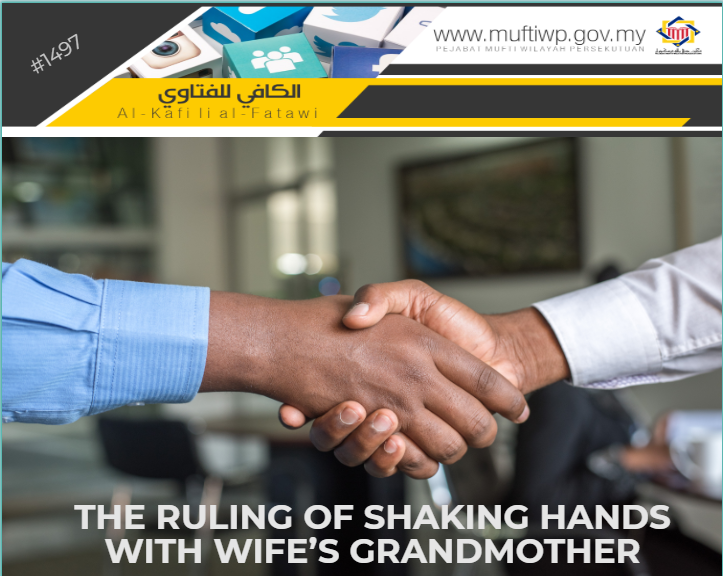Question:
Assalamualaikum Dato’. I want to ask, is it permissible for my son-in-law to shake hands with my mother?
Answer:
Waalaikumussalam w.b.t,
Alhamdulillah, praise and thanks to Allah for the countless blessings He has blessed us all with. Blessings and salutations to the Prophet Muhammad PBUH, his wives, his family, companions and all those that follow his teachings to the day of judgement.
Lexically, there are several definitions of mahram. We summarized some of them as follows:
- Individuals who are prohibited for one to get married to either due to rahim or qarabah relationship.
- Something prohibited by Allah SWT
While according to Fiqh perspective, mahram means: “Individuals we are prohibited to marry and the prohibition is in the form of al-ta’bid (eternal) due to mubah reasons, not due to their honor and not due to removable prohibition”. Refer Kaasyifah al-Saja, Nawawi bin ‘Umar (Hlm. 114).
In explaining the meanings of the definitions above, we detail it as follows:
The phrase ‘in the form of al-ta’bid’ means: It does not include wife’s female siblings. The same for wife’s paternal and maternal aunts. This is because, the prohibition is only when they are gathered (means be married to at the same time between the wife and the stated women).
While the phrase ‘not due to their honor’ means the wives of the Prophet PBUH. This is because, the prohibition is due to their honor. Hence, it is prohibited upon all ummah as well as other prophets.
And the phrase ‘not due to removable prohibition’ is like the Majus women, or the apostates. This is because, the prohibition is due to reasons which are removable. Hence, they may be halal at other time (like when they embrace Islam).
The description on the mahram is stated in the saying of Allah SWT:
حُرِّمَتْ عَلَيْكُمْ أُمَّهَاتُكُمْ وَبَنَاتُكُمْ وَأَخَوَاتُكُمْ وَعَمَّاتُكُمْ وَخَالَاتُكُمْ وَبَنَاتُ الْأَخِ وَبَنَاتُ الْأُخْتِ وَأُمَّهَاتُكُمُ اللَّاتِي أَرْضَعْنَكُمْ وَأَخَوَاتُكُم مِّنَ الرَّضَاعَةِ وَأُمَّهَاتُ نِسَائِكُمْ وَرَبَائِبُكُمُ اللَّاتِي فِي حُجُورِكُم مِّن نِّسَائِكُمُ اللَّاتِي دَخَلْتُم بِهِنَّ فَإِن لَّمْ تَكُونُوا دَخَلْتُم بِهِنَّ فَلَا جُنَاحَ عَلَيْكُمْ وَحَلَائِلُ أَبْنَائِكُمُ الَّذِينَ مِنْ أَصْلَابِكُمْ وَأَن تَجْمَعُوا بَيْنَ الْأُخْتَيْنِ إِلَّا مَا قَدْ سَلَفَ ۗ إِنَّ اللَّـهَ كَانَ غَفُورًا رَّحِيمًا
Prohibited to you [for marriage] are your mothers, your daughters, your sisters, your father's sisters, your mother's sisters, your brother's daughters, your sister's daughters, your [milk] mothers who nursed you, your sisters through nursing, your wives' mothers, and your step-daughters under your guardianship [born] of your wives unto whom you have gone in. But if you have not gone in unto them, there is no sin upon you. And [also prohibited are] the wives of your sons who are from your [own] loins, and that you take [in marriage] two sisters simultaneously, except for what has already occurred. Indeed, Allah is ever Forgiving and Merciful.
Surah al-Nisaa’ (23)
Imam al-Mawardi Rahimahullah cited words of Imam al-Syafi’e:
أَصْلُ مَا يَحْرُمُ بِهِ النِّسَاءُ ضَرْبَانِ أَحَدُهُمَا بأنسابٍ، وَالْآخَرُ بأسبابٍ مِنْ حَادِثِ نكاحٍ أَوْ رضاعٍ
The original rules which make a woman becomes mahram are divided into two. First is the ansab (lineage) and the second one is asbab (reasons), which comes from marriage or nursing. Refer Al-Hawi Al-Kabir, Al-Mawardi (9/196).
Then, Imam al-Mawardi detail it further when he says: Mahram women are in two categories. Firstly: Those who are prohibited eternally. While the other one is prohibited when gathered (in one marriage). And those who are prohibited eternally are divided into two which are through nasab and asbab (marriage and nursing). Refer Al-Hawi Al-Kabir, Al-Mawardi (9/196).
The implication of prohibition under the category of nasab and asbab (marriage and nursing) are as follows:
- It is prohibited (haram) to get married to her.
- One may shake hands with her.
- One may be alone together (khalwah) with her.
Hence, referring back to the above question, we state here that women who are included under mahram are mothers of the wife. This is in accordance with the saying of Allah SWT:
وَأُمَّهَاتُ نِسَائِكُمْ
your wives' mothers
Surah al-Nisaa’ (23)
The above excerpt is the argument of Imam al-Syafi’e in stating his statement: If a man marries a woman, then his wife passes away or he divorces her and not yet having intercourse with her, then I am not of the opinion that he can marry her mother (mother of the deceased or divorced woman). Refer al-Umm, Imam Al-Syafi’e (5/160).
While Imam Abu Ishaq al-Shirazi said: And it is haram upon him through musaharah; the mother of the wife whether he have had intercourse with or not according to the saying of Allah SWT:
وَأُمَّهَاتُ نِسَائِكُمْ
your wives' mothers
Surah al-Nisaa’ (23)
And it is haram upon him all mothers related to the wife among the paternal and maternal grandmothers. Refer Al-Muhazzab fi Fiqh Al-Syafi’e, Abu Ishaq Al-Shirazi (2/439).
Imam al-Nawawi Rahimahullah said:
فأما أم الزوجة فإن الرجل إذا عقد النكاح على إمرأة حرمت عليه كل أم لها حقيقة أو مجازا من جهة النسب أو من جهة الرضاع سواء دخل بها أو لم يدخل
Pertaining to the mother of the wife, indeed, a man when he solemnizes with a woman, then it is haram for him to marry all mothers of his wife literally or metaphorically, through nasab or nursing, whether he had intercourse with his wife or not.
Refer Al-Majmu’ Syarah Al-Muhazzab, Al-Nawawi (16/217)
Conclusion
In conclusion, we state here that wife’s grandmother is a mahram due to al-musaharah because she is included in the meaning of mother of the wife and above like grandmother and great-grandmother. Mahram happens when solemnization is completed and it is not on the condition of having had intercourse with the wife first. Hence, it is not a problem for a man to shake hands with his wife’s grandmother whether it is paternal or maternal grandmother because they are among the mahram.
Lastly, may Allah SWT bless us with correct understanding in this religion. Ameen.
